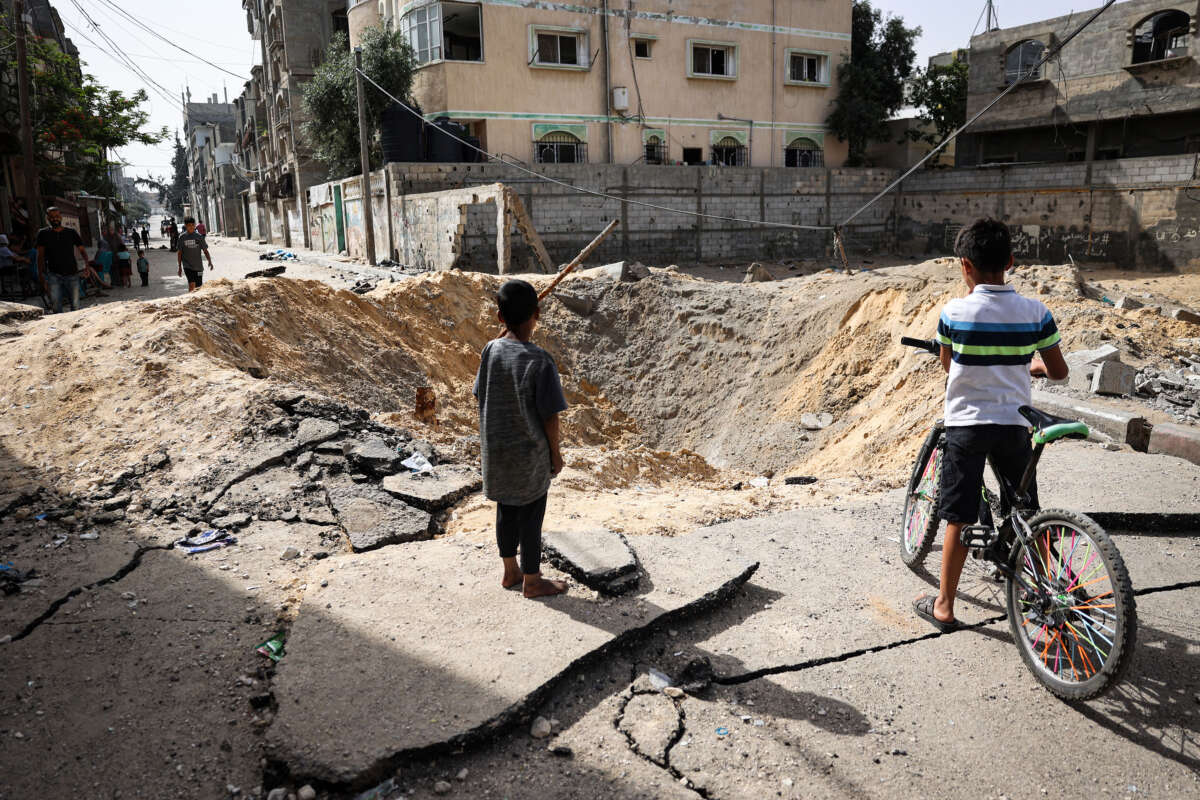Israeli forces have demonstrated a pattern of systematically targeting densely populated civilian areas across hundreds of attacks in Gaza that likely violate international wartime laws, the office of the UN High Commissioner for Refugees (UNHCR) found in a report released Wednesday.
“Monitoring by OHCHR strongly indicates that the Israeli Defense Forces have systematically failed to comply with the following fundamental principles of international humanitarian law in its conduct of hostilities in Gaza since 7 October: the principle of distinction, the prohibition of indiscriminate attacks, the principle of proportionality and the principle of precautions in attack,” the report said.
“These attacks of an apparent indiscriminate nature are among hundreds of a similar nature, giving rise to the appearance of a pattern of attacks over months,” the report went on.
The analysis laid out six incidents carried out between October and December of 2023 that it said were emblematic of Israel’s indiscriminate bombings. Israel targeted the attacks on densely populated areas and used weapons that arms experts and the UNHCR said should not be used on civilian neighborhoods due to the huge amount of collateral damage they cause.
According to the report, each attack likely used either GBU-31, GBU-32 or GBU-39 bombs, which are 2,000, 1,000 and 250 pound bombs, respectively. These are U.S.-made JDAMs, manufactured by Boeing.
The incidents laid out by the UNHCR include the October 31 bombing of Jabalia refugee camp in northern Gaza, which was then the worst single attack carried out by Israel in its genocide. The attack was carried out with at least four GBU-32s or potentially GBU-31s, and destroyed 10 buildings and damaged 10 more.
UNHCR verified at least 56 people killed in the incident. Other analyses, like one by London war analyst Airwars, have found that over 120 people, including 69 children, were killed in the strike, while hundreds of others were injured.
The report also highlighted a December attack on Ash Shujai’yeh in Gaza City that it said is emblematic of the indiscriminate nature of Israel’s bombing campaign. Israeli forces dropped at least nine GBU-31s on the neighborhood — then one of the most densely populated parts of Gaza. The review found that at least 60 Palestinians were killed in the attack, while 15 buildings were destroyed and 14 others damaged. This attack could amount to an “area bombardment,” another form of an indiscriminate attack, the report said.
In each of these attacks, the Israeli army claimed that it was targeting or had killed a Hamas operative — but, as the UNHCR points out: “The mere presence of one commander, or even several combatants, or of several distinct military objectives in one area, does not render an entire neighbourhood a military objective.”
It is a violation of international law to not make every attempt possible to avoid civilian deaths in military objectives; dozens or hundreds of collateral deaths is typically not considered acceptable even for extremely high-level targets like commanders.
According to the analysis, in 87 percent of Israel’s attacks since October, over five people have been killed, while 10 or more have been killed in over 60 percent of Israel’s attacks. This proportion alone suggests widespread war crimes, the report said. Meanwhile, the very use of 2,000, 1,000 and 250 pound bombs in these densely populated areas could amount to wartime violations. Further, the UNHCR wrote, the launching of such large bombs in this way could indicate direct attacks on civilians.
Meanwhile, Israeli officials have been clear about their objectives, as the report points out. In October, Israel Defense Forces (IDF) Major General Ghassan Alian referred to“Hamas and the residents of Gaza” as “human beasts” and told them, “you wanted hell, you will get hell.” The report quoted another IDF spokesperson saying at the beginning of Israel’s current incursion into Gaza that they’re “focused on what causes maximum damage.”
Trump is silencing political dissent. We appeal for your support.
Progressive nonprofits are the latest target caught in Trump’s crosshairs. With the aim of eliminating political opposition, Trump and his sycophants are working to curb government funding, constrain private foundations, and even cut tax-exempt status from organizations he dislikes.
We’re concerned, because Truthout is not immune to such bad-faith attacks.
We can only resist Trump’s attacks by cultivating a strong base of support. The right-wing mediasphere is funded comfortably by billionaire owners and venture capitalist philanthropists. At Truthout, we have you.
Truthout has launched a fundraiser to raise $34,000 in the next 5 days. Please take a meaningful action in the fight against authoritarianism: make a one-time or monthly donation to Truthout. If you have the means, please dig deep.
